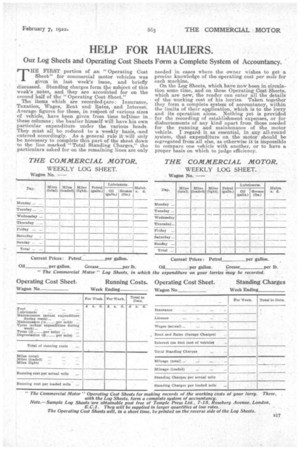HELP FOR HAULIERS.
Page 19

If you've noticed an error in this article please click here to report it so we can fix it.
HE FIRST portion of an "Operating Cost Sheet" for commercial motor vehicles was
given in last week's issue, and briefly discussed. Standing charges form the subject of this week's notes, and they are accounted for on the second -half of the "Operating Cost Sheet."
The items which are recordediare: Insurance, Taxation, Wages, Rent and Rates, and Interest. Average figures for these, in respect of various sizes of vehicle, have been given from time tortime in these columns ; the haulierhimself will have his own particular expenditure under the various heads. They must all be reduced to a weekly basis, and entered accordingly. As a general rule it will only be necessary to complete this part of the sheet down to the line marked "Total Standing Charges," the particulars asked for on the remaining lines are only
needed in cases where the owner wishes to get a precise knowledge of the operating cost per mile for each machine.
On the Log Sheets, which have now been in circulation some time, and on these Operating Cost Sheets, which are new, the reader can enter all the details of the working cost of his lorries. Taken together they form a complete system of accountancy, within the limits of their application, which is to the lorry and its operation alone. Nothing yet is provided for the recording of establishment expenses, or for disbursements of any kind apart from those needed for the running and maintena,nce of the motor vehicle. I regard it as essential, in any all-round system, that expenditure on the motor should be segregated from all else, as otherwise it is impossible to compare one vehicle with another, or to have a proper basis on which to judge efficiency.




























